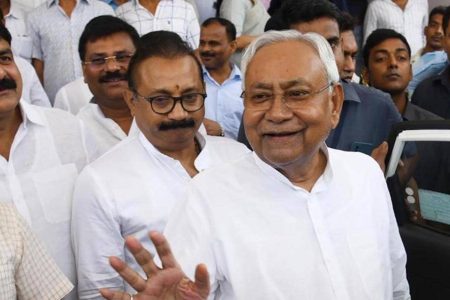The Janata Dal (United) and the Rashtriya Janata Dal (RJD) is likely to propose a formula of performance in past three elections, including both assembly and Lok Sabha, along with the vote share in these polls to decide on parties getting tickets to have united opposition candidates against the Bharatiya Janata Party (BJP) in 2024 Lok Sabha polls, leaders from the grand alliance (GA) have said.
The leaders said the formula will be part of the blueprint for discussion on June 23 meeting of the opposition leaders in Patna.
Bihar chief minister Nitish Kumar has called on the opposition parties meeting in which Congress president Mallikarjun Kharge and party leader Rahul Gandhi are expected to attend.
“There has to be a mechanism to decide on how many seats each party in any state deserves. So, a formula will be used where vote share achieved by any party in last three elections as well as seats won by them would be taken into consideration. The calculations would be done and based on the percentile, seats will be allotted,” said a senior GA leader, aware of the developments.
The above leader added that once the front takes share, poll managers in each party will sit together to work on a seat sharing arrangement based on vote share-seats won arithmetic.
The GA leaders feel that the formula will present fairness to the seat sharing among political parties especially in the states with regional parties.
“It would be a useful method to avoid disputes over seat sharing and also help in amicable seat sharing between regional parties and Congress in states where the grand national party is in coalition with regional allies like in Bihar and Jharkhand,” the party leader quoted above said.
Also Read: Opposition parties unlikely to ink common minimum programme at Patna meet
A leader belonging to RJD aware about the preparations for June 23 meeting said that the formula can work even in states such as West Bengal and Uttar Pradesh, where seat sharing between Congress and regional allies like Trinamool Congress (TMC), Samajwadi Party (SP) will be no easy task.
“This could be a broad outline for an amicable seat sharing arrangement,” he said.
There are already speculations that the Congress is keen on staking claim on at least 350 seats across the country including Bihar, Jharkhand, West Bengal and Delhi where regional allies like TMC, Jharkhand Mukhi Morcha (JMM), Aam Aadmi Party (AAP) and RJD-JD(U) are ruling parties having bigger vote share.
Another grand alliance leader said the formula gives weightage to a party that may have won a higher number of seats despite getting lesser vote share than its ally.
This, according to the leader, could help JD (U) in getting more Lok Sabha seats in comparison to RJD in Bihar, which failed to win even a single seat in 2019 Lok Sabha elections though it had performed better than JD (U) in 2015 and 2020 assembly polls respectively.
The ruling JD(U), which realigned with the RJD in August 2022 after snapping ties with the BJP, had won 16 Lok Sabha seats in 2019 as a constituent of the NDA (National Democratic Alliance).
In 2020 assembly polls, the party had won only 43 assembly seats whereas RJD (then in opposition as part of the GA) had won 75 seats and Congress had won 19 seats.
GA leaders said that the RJD-JD(U) leaders are pitching in for this methodology reasoning that the same arithmetic was used for seat sharing among constituents which had joined the Janata Party led alliance in 1977 for parties such as Socialist Party, Bhartiya Lok Dal.
The Janata Party had trounced the Congress to come to power after the general elections in 1977.
Bhola Yadav, national general secretary of the RJD, said a formula is needed to work out a seat sharing arrangement.
“Once the meeting takes place, the exercise of seat sharing will be done. We will apply the method of assessing the strength of each party based on a formula and of course, vote share will be a part of it,” he said.
KC Tyagi, chief spokesperson of the JD(U), maintained there will be a mechanism to decide the seat allotment among allies but at the moment, the June 23 meeting holds significance given the fact that CM Kumar is keen on bringing on board all the opposition parties.
“We will sit on June 23 and hold discussions on uniting the opposition. We have identified around 450 seats where there is a scope of straight fight between opposition and BJP on the one against one formula,” he said.
Nawal Kishore Choudhary, political observer and former principal of Patna College, said the idea of using a formula to decide seat sharing among the ‘would be’ allies of the larger opposition front was an ‘over optimism’.
“Politics is not arithmetic where two plus two adds to four. It is more than that. Using a formula to decide seat sharing can only facilitate the process but it will not be enough. There are more challenges to be faced as the front will have parties that play identity politics and have regional dominance in their respective states. The seat sharing work will be a complex process,” he said.
Choudhary also highlighted that in 1977, the opposition unity was achieved as the scenario was different and many opposition parties had merged to form Janata Party.
“Over the past four decades, regional parties have grown and have their own identity. Unless there is sacrifice of their egos, dynastic interests, it is doubtful parties would agree on a common term,” he added.
On Friday, as many as 15 opposition party heads including Congress leader Rahul Gandhi, Congress president Kharge, TMC chief and West Bengal CM Mamata Banerjee, Samajwadi Party chief Akhilesh Yadav, Tamil Nadu CM MK Stalin, Jharkhand CM Hemant Soren, Delhi CM Arvind Kejriwal and other prominent Left leaders are scheduled to participate in the Patna meet.

